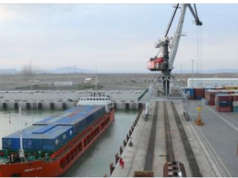Oil prices dropped on July 5 amid geopolitical tensions around North Korea, while investors also expect data on oil reserves for the week in the U.S..
Benchmark Brent crude futures are down 1.4 percent, at $48.92 per barrel, U.S. West Texas Intermediate (WTI) crude futures are down 1.7 percent, at $46.27 per barrel after reaching a fresh one-month high of $47.32 earlier in the session, Reuters reported
“High June OPEC production and the recent strengthening of the dollar should cap any attempt to push prices higher,” said Tamas Varga, senior analyst at London brokerage PVM Oil Associates.
Oil exports by OPEC climbed for a second month in June, Thomson Reuters Oil Research data showed.
OPEC exported 25.92 million barrels per day in June, up 450,000 barrels per day from May and 1.9 million barrels per day more than a year earlier.
Also the growth of geopolitical tension in connection with the launch of the North Korean missile reduces the demand for risky assets, which include oil, RIA Novosti reported.
North Korea has launched an intercontinental ballistic missile Hwasong-14, which fell in the Sea of Japan 300 kilometers from the coast of Japan.
Market participants also expect statistics on oil stocks in the U.S., which will be published on July 6. Analysts predict a drop in inventories by 0.56 percent, or by 2.833 million barrels, to 506.367 million barrels.
The U.S. Energy Department reported last week that commercial oil reserves in the U.S. (excluding the strategic reserve) for the week ended June 23, increased by 0.1 million barrels, or by less than 0.1 percent – to 509.2 million barrels.
Another factor affecting the world oil prices is Russia’s statement about opposing deeper production cuts, according to Bloomberg.
Deepening cuts would suggest that OPEC, Russia and their allies are nervous that the pact to reduce output by 1.8 million barrels a day through March 2018 isn’t doing enough to support prices, one of the Russian officials stated.
“Any proposal to cut deeper would result in an overshooting in prices, which would rapidly prove self-defeating due to the unprecedented velocity of U.S. shale oil,” said Jan Edelmann, an analyst at HSH Nordbank AG in Hamburg. “The rebalancing process in global oil markets is still making progress.”
OPEC and other major oil producers agreed in December 2016 to remove 1.8 million barrels a day from the market.
OPEC has decided to extend its production cuts till March 2018, as the oil cartel and its allies step up their attempt to end a three-year supply glut that has savaged crude prices and the global energy industry.






